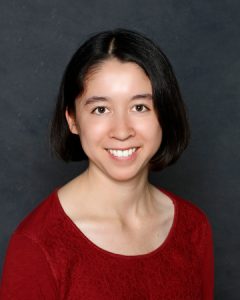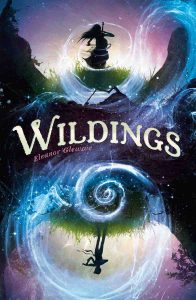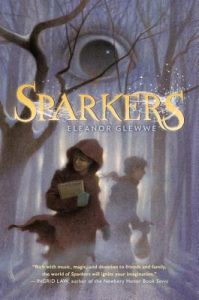
Eleanor Glewwe is the author of “Wildings.” She studied linguistics, French and Chinese, and worked in the music library, shelving composers’ biographies and binding scores with a needle and thread at Swarthmore College. Eleanor lives in Los Angeles, where she is a graduate student in linguistics. The following is a complete transcript of her interview with Cracking the Cover.
About “Wildings”:
Rivka is one of the magical elite and the daughter of an important ambassador. But she harbors a deep secret: She once had a twin brother, Arik. When Arik failed to develop his own magical abilities, the government declared him a wilding, removed him from his home, placed him with nonmagical adoptive parents, and forbade him any contact with his birth family. But Rivka refuses to forget her brother. Even though she knows she could lose everything, she sets out to find Arik. She has nothing to go on except her still-new magical powers and her love for her brother. Can that possibly be enough to bring them together again, when all of society believes they belong apart? —Synopsis provided by Viking books for Young Readers
Why do you write? Why specifically for young readers?
I write because I have stories in my head that I want to get out on paper. I think I write for young readers because I began writing as a child, and for years I just wrote about characters who were my own age. Even as I grew into adulthood, I kept reading middle grade and young adult books, and my characters stopped getting older with me. There’s so much wonder in books for young readers, such captivating worlds, and I really love staying in the midst of that.
Along those lines, what role does your background in/study of linguistics play in your writing?
My linguistics background influences my writing in a few different ways. My interest in languages shows up in my books, particularly Sparkers, in which the two main characters read grammars for fun and decipher a language together.
Being a linguist also helps with worldbuilding. I have actually invented languages or language fragments for fantasy stories I’ve written, though I didn’t for Sparkers and Wildings (there are no complete languages underlying the few invented words I put into those books). Having an understanding of linguistics definitely helps in creating a realistic invented language, which is my goal, even if only a tiny bit of the language makes it onto the page.
Constructed languages aside, being a linguist makes me more conscious of other linguistic aspects of my world: What different languages are spoken? Who has what kind of accent? What kind of writing system are the characters using (this sort of detail matters if I make reference to, for example, files stored in alphabetical order—is there an alphabet?)?
Finally, my linguistic background informed my portrayal of Marah’s brother Caleb, who is deaf. I wouldn’t have known home sign, which is how Caleb communicates with his family in Sparkers, existed if it weren’t for my study of linguistics. As a linguist, I also know that sign languages are full-fledged languages, as expressive and complex as spoken languages, and I tried to convey this in Wildings. While it was through linguistics that I learned about Deaf culture and issues important to the Deaf community, I’m not deaf, and I had help from a couple of Deaf readers in writing Caleb.
 Summarize “Wildings” for me in 15 words or less.
Summarize “Wildings” for me in 15 words or less.
In searching for her long-lost twin brother, Rivka embarks on a mission to fight injustice.
“Wildings” is a companion book to “Sparkers” but they’re not dependent on each other. Did you always plan a second book? Why did you chose to make them standalones?
Back when I first wrote Sparkers, when I was quite young, I did have some ideas about how Marah’s story would continue, but they didn’t really constitute an idea for a whole second book. Much later, when it came time to write the next book after Sparkers, I at first envisioned a direct sequel, though I didn’t already have a story in mind. As I tried to come up with one, my agent and editor encouraged me to consider shifting the focus to a new protagonist, that is, not writing a direct sequel to Sparkers. I’m glad they did because I discovered Rivka’s story.
Since you had already created your world in “Sparkers” was it easier to write “Wildings”?
To some extent, yes. Since both books take place in the same city, a lot of the worldbuilding needed for Wildings was already done. I knew what the landmarks were and where they were, I had a street map, and so on.
What new challenges did you face?
Although Wildings has the same setting as Sparkers, Rivka comes from another city, so I had to develop that city more fully in this book. I had to make decisions about how similar Rivka’s home city was to Ashara in terms of political institutions, terms for people with and without magic, language, etc. Most importantly, I had to work out the details of how the musical magic Rivka uses worked. Another challenge was striking the right balance in terms of how much to allude to Sparkers. I had to work in enough of the backstory to provide the necessary context for the plot of Wildings, but since Wildings was supposed to be its own story, I also had to resist the temptation to make too many references to characters and events from Sparkers that would mean nothing to or puzzle readers who hadn’t read the first book.
How did Rivka’s character develop?
Rivka started out as a minor character, the daughter of a foreign ambassador who got kidnapped for political reasons, back when I still thought I was going to write a direct sequel to Sparkers. Once she became the main character, I spent some time thinking through what had shaped her personality and why she acted the way she did.
It was interesting considering how Rivka’s relationship with music differed from Marah’s in Sparkers. Rivka does love music, but since her magic is musical, playing the cello is bound up with casting spells and living up to her father’s expectations. It’s also a reminder of the reason her brother was taken away. The loss of her brother motivates a lot of Rivka’s character and behavior. Because she receives little support from family or friends, and because she hangs on to a dream that society tells her to abandon, she isolates herself. She’s so focused on finding her brother again that she doesn’t see the need to form bonds with anyone else unless she needs something. Over the course of Wildings, though, she comes to recognize the value of friendship.
 Music plays a key role in your books. Why did you chose to include it? What elements of your own musical background did you draw from?
Music plays a key role in your books. Why did you chose to include it? What elements of your own musical background did you draw from?
In my college fiction workshop, my classmates labeled me the one who always wrote about music. My cello teacher wanted me to go to music school, which I knew wasn’t the right path for me, but I guess instead of becoming a professional musician I became a writer who can’t stop writing about music.
Music is a very important part of my life, so it often feels natural to make it a part of my characters’ lives. In Sparkers, I drew on my own experiences playing in school orchestras. Like Marah, I had an amazing middle school orchestra teacher. I also based Marah’s audition on my own many auditions. I myself play the cello, and I’m not really sure why I made Marah a violinist. In Wildings, Rivka is a cellist, like me. She also dabbles in violin, though, and this is also based on my own experience: I taught myself to play the violin (not very well) by borrowing my friends’ instruments.
Looking back, how has your writing evolved?
I honestly don’t have a good answer to this question. I think I might be too close to my own writing to be able to tell. I’d like to think my writing has gotten technically better, of course, but I seem to continue to be preoccupied with the same themes and motifs (friendship, injustice, music…).
What are you working on now?
I’m working on a young adult novel set in an entirely different world. Like Wildings, it contains a lot of music, and a different kind of musical magic. The protagonist and her foster siblings are itinerant musicians.
Is there a book from your own childhood that still resonates with you today? Why?
There are probably a few, but the one that comes to mind now is Philip Pullman’s His Dark Materials trilogy, and particularly the first volume, The Golden Compass. I remember being in awe of this trilogy when I finished it for the first time (I might have been twelve?), and I reread The Golden Compass this summer and found it still swept me into Lyra’s world in the same way. Spectacular worldbuilding aside, I love the complex relationships between the characters and the way the theme of loyalty shines through.
